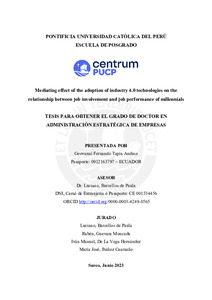| dc.contributor.advisor | Barcellos de Paula, Luciano | |
| dc.contributor.author | Tapia Andino, Geovanni Fernando | |
| dc.date.accessioned | 2023-10-20T20:12:08Z | |
| dc.date.available | 2023-10-20T20:12:08Z | |
| dc.date.created | 2023 | |
| dc.date.issued | 2023-10-20 | |
| dc.identifier.uri | http://hdl.handle.net/20.500.12404/26218 | |
| dc.description.abstract | A pesar del interés reciente en la Industria 4.0, se sabe poco sobre la relación entre el
involucramiento laboral y el desempeño laboral de los trabajadores millennials en las
empresas. El presente estudio aborda esta brecha de conocimiento al explorar la mediación de
la adopción de tecnologías de la Industria 4.0 (IND) entre el involucramiento laboral (INV) y
el desempeño laboral (PRF). Se recopilaron datos de una muestra por conveniencia integrada
por 241 empleados de grandes empresas canadienses. Se utilizó un modelo de ecuaciones
estructural para comprobar el efecto de la mediación de IND en la relación entre INV y PRF.
Los resultados basados en este modelo (SEM), los cuales son válidos para la muestra,
revelaron diferencias por género. Se encontró que en hombres, INV se relacionó
positivamente con PRF y que en mujeres, INV se relacionó positivamente con IND, aunque
también se evidenció que los empleados millennials mostraron actitudes de género igualitarias
al percibir fuertemente IND positivamente con PRF. Además, IND midió completamente la
relación entre INV y PRF en empresas manufactureras pero no en empresas de servicios.
También se encontró que los años de experiencia laboral afectan el efecto de mediación de
IND entre INV y PRF, mientras que no fue significativo para el nivel educativo. Este estudio
también destaca criterios demográficos como la edad, los ingresos y el estado de los
empleados millennials. Se discuten las implicaciones de estos hallazgos y se brindan
conocimientos útiles sobre los nuevos enfoques I4.0 que mejoran los procesos industriales.
Esta investigación confirmaron la Teoría del Comportamiento Planificado y propone que los
directivos utilicen enfoques actuales de mejora continua, centrados en el ser humano y
coherentes con las nuevas tecnologías I4.0. El muestro por conveniencia se aplicó debido a la
dificultad al acceso de los empleados en compañías que usaban las tecnologías de la I4.0
durante el periodo de COVID. | es_ES |
| dc.description.abstract | Despite recent interest in Industry 4.0, little is known about the relationship between job
involvement and job performance of millennial workers in companies. The present study
addresses this knowledge gap by exploring the mediation of the adoption of Industry 4.0
technologies (IND) between job involvement (INV) and job performance (PRF). Data was
collected from a convenience sample of 241 employees of large Canadian companies. A
structural equation model was used to test the mediation effect of IND and the relationship
between INV and PRF. Results based on this model (SEM), which are valid only for the
sample, revealed differences by gender. It was found that in men, INV was positively related
to PRF and that in women, INV was positively related to IND, although it was also evident
that millennial employees showed egalitarian gender attitudes by strongly perceiving IND
positively with PRF. Furthermore, IND fully measured the relationship between INV and PRF
in manufacturing firms but not in service firms. Years of work experience was also found to
affect the mediation effect of IND between INV and PRF, while it was not significant for
education level. This study also highlights demographic criteria such as the age, income, and
status of millennial employees. Implications of these findings are discussed, and useful
insights are provided on new I4.0 approaches that improve industrial processes. This research
contributes to confirming the Theory of Planned Behaviour and proposes that managers use
current continuous improvement approaches, human-centred and consistent with new I4.0
technologies. The convenience sampling was used due to the difficulty in accessing
employees at companies that use I4.0 technologies during the COVID period. | es_ES |
| dc.language.iso | eng | es_ES |
| dc.publisher | Pontificia Universidad Católica del Perú | es_ES |
| dc.rights | info:eu-repo/semantics/closedAccess | es_ES |
| dc.rights.uri | http://creativecommons.org/licenses/by-nc-nd/2.5/pe/ | * |
| dc.subject | Empresas--Canadá | es_ES |
| dc.subject | Innovaciones tecnológicas | es_ES |
| dc.subject | Comportamiento organizacional | es_ES |
| dc.subject | Trabajo--Productividad | es_ES |
| dc.title | Mediating effect of the adoption of industry 4.0 technologies on the relationship between job involvement and job performance of millennials | es_ES |
| dc.type | info:eu-repo/semantics/doctoralThesis | es_ES |
| thesis.degree.name | Doctor en Administración Estratégica de Empresas | es_ES |
| thesis.degree.level | Doctorado | es_ES |
| thesis.degree.grantor | Pontificia Universidad Católica del Perú. CENTRUM | es_ES |
| thesis.degree.discipline | Administración Estratégica de Empresas | es_ES |
| renati.advisor.cext | 001534456 | |
| renati.advisor.orcid | http://orcid.org/0000-0003-4249-0565 | es_ES |
| renati.author.cedula | EC / 0912163797 | |
| renati.discipline | 413038 | es_ES |
| renati.juror | Barcellos de Paula, Luciano | es_ES |
| renati.juror | Guevara Moncada, Ruben | es_ES |
| renati.juror | De la Vega Hernández, Iván Manuel | es_ES |
| renati.juror | Ibáñez Caamaño, María José | es_ES |
| renati.level | https://purl.org/pe-repo/renati/level#doctor | es_ES |
| renati.type | https://purl.org/pe-repo/renati/type#tesis | es_ES |
| dc.publisher.country | PE | es_ES |
| dc.subject.ocde | https://purl.org/pe-repo/ocde/ford#5.02.04 | es_ES |







